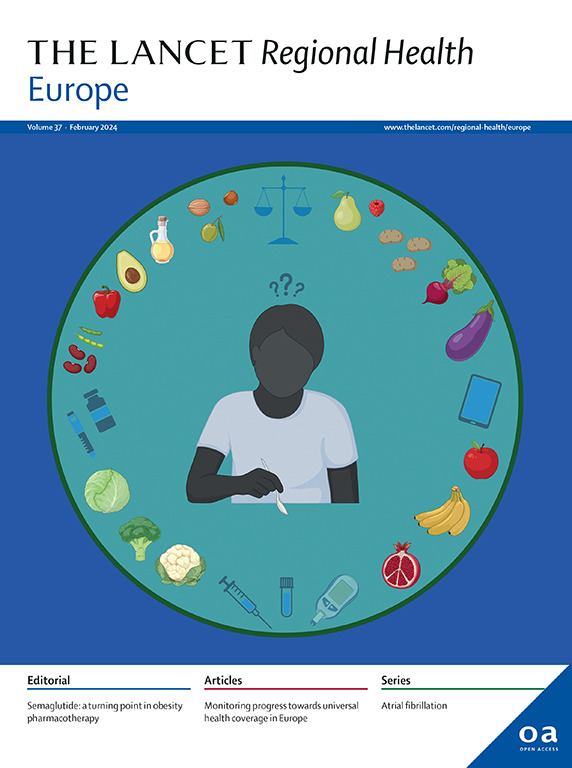Risk of recurrence in early-onset versus late-onset non-metastatic colorectal cancer, 2004–2019: a nationwide cohort study
IF 13
Q1 HEALTH CARE SCIENCES & SERVICES
引用次数: 0
Abstract
Background
The incidence of colorectal cancer (CRC) in individuals younger than 50 years of age (early-onset CRC) is increasing. Early-onset CRC often present at advanced stage, suggesting a more aggressive cancer course compared to late-onset CRC (age 50–79). This nationwide cohort study estimates the incidence of recurrence following early-onset CRC and late-onset CRC.
Methods
The study included all Danish patients <80 years old operated for first-time Union for International Cancer Control (UICC) stage I–III CRC between January 2004 and December 2019. Recurrence status was determined by applying a validated algorithm to individual-level data from nationwide health registries. The 5-year cumulative incidence functions (CIF) of recurrence were reported for early-onset versus late-onset CRC. The difference in time to recurrence was estimated as a time ratio (TR) using an accelerated failure time model.
Findings
Among 25,729 CRC patients, 1441 (5.6%) had early-onset CRC. Compared to late-onset CRC, early-onset was associated with advanced disease stages and higher treatment intensity. The 5-year CIF of recurrence was 29% (95% CI: 26%–31%) in early-onset versus 21% (95% CI: 21%–22%) in late-onset CRC. The higher CIF of recurrence for early-onset patients persisted in stage-stratified analysis. Time to recurrence was shorter in early-onset versus late-onset patients with TR = 0.76 (95% CI: 0.67–0.85). The 5-year CIF of recurrence decreased from 2004 to 2019 for both early- and late-onset patients–most prominent for early-onset patients.
Interpretation
Early-onset CRC was associated with higher incidence of recurrence at all disease stages. Indicating that the increased risk is not explained by delayed diagnosis. The excess risk diminished from 2004 to 2019, suggesting that early-onset CRC may achieve a similar recurrence risk as late-onset CRC in a contemporary setting.
Funding
Aarhus University, Novo Nordisk Foundation, Innovation Fund Denmark, and the Danish Cancer Society.
2004-2019 年早期与晚期非转移性结直肠癌的复发风险:一项全国性队列研究
背景50岁以下人群的结直肠癌(CRC)发病率(早发 CRC)正在上升。与晚期(50-79 岁)结直肠癌相比,早发结直肠癌通常处于晚期,这表明其癌症病程更具侵袭性。这项全国性队列研究估算了早发 CRC 和晚发 CRC 的复发率。研究纳入了 2004 年 1 月至 2019 年 12 月间首次接受国际癌症控制联盟(UICC)I-III 期 CRC 手术的所有 80 岁丹麦患者。复发状况是通过对来自全国健康登记处的个人层面数据应用一种经过验证的算法来确定的。报告了早发与晚发 CRC 的 5 年复发累积发生率函数 (CIF)。研究结果在 25729 例 CRC 患者中,有 1441 例(5.6%)为早发 CRC。与晚发性 CRC 相比,早发性 CRC 与疾病晚期和较高的治疗强度有关。早发 CRC 的 5 年复发 CIF 为 29%(95% CI:26%-31%),而晚发 CRC 为 21%(95% CI:21%-22%)。在分期分层分析中,早发患者复发的 CIF 仍较高。早发患者的复发时间比晚发患者短,TR = 0.76 (95% CI: 0.67-0.85)。从2004年到2019年,早发和晚发患者的5年复发CIF均有所下降,其中以早发患者最为突出。这表明,延迟诊断并不能解释风险增加的原因。从2004年到2019年,超额风险有所降低,这表明在当代环境下,早发CRC的复发风险可能与晚发CRC相似。
本文章由计算机程序翻译,如有差异,请以英文原文为准。
求助全文
约1分钟内获得全文
求助全文
来源期刊

Lancet Regional Health-Europe
Multiple-
CiteScore
19.90
自引率
1.40%
发文量
260
审稿时长
9 weeks
期刊介绍:
The Lancet Regional Health – Europe, a gold open access journal, is part of The Lancet's global effort to promote healthcare quality and accessibility worldwide. It focuses on advancing clinical practice and health policy in the European region to enhance health outcomes. The journal publishes high-quality original research advocating changes in clinical practice and health policy. It also includes reviews, commentaries, and opinion pieces on regional health topics, such as infection and disease prevention, healthy aging, and reducing health disparities.
 求助内容:
求助内容: 应助结果提醒方式:
应助结果提醒方式:


